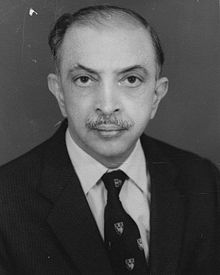- Dorab Patel
-
Honorable Right Chief Justice Dorab Framrose Patel 
Chief Justice Dorab Patel, 1974 Chief Justice of the Supreme Court of Pakistan In office
7 January 1976 – March 24, 1981Nominated by Zulfikar Ali Bhutto Appointed by Fazal Ilahi Chaudhry Preceded by Hamoodur Rahman Succeeded by Mohammad Haleem Chief Justice of Sindh High Court In office
April 16, 1970 – January 7, 1976Nominated by Zulfikar Ali Bhutto Chief Justice of West Pakistan High Court In office
December 6, 1967 – April 16, 1970Nominated by Ayub Khan Personal details Born Dorab Framrose Patel
June 17, 1924
Mumbai, British Indian EmpireDied March 15, 1997 (aged 72)
Islamabad, Islamabad Capital TerritoryResting place Karachi, Sindh Province Nationality  Pakistan
PakistanResidence Islamabad, Pakistan Alma mater Bombay University
(LLB)
London School of Economics
(M.Sc. and (LLM)
Lincoln’s Inn
(JD)Occupation Barrister Profession Jurist and Judge Religion Zorastrian Chief Justice Dorab Framrose Patel (b.1924 Quetta[1] - d.15 March 1997), was a Pakistan jurist, and lawmaker who served as a former Chief Justice of Supreme Court of Pakistan and former Chief Justice of Sindh High Court. Justice Patel was a prominent campaigner for the human rights, and was a founding member of the Asian Human Rights Commission (AHRC) in 1987 and the co-founder of the Human Rights Commission of Pakistan.
A Parsee by faith, he rose up the ranks of the judiciary to become one of Pakistan's most senior most judges, only to resign on principle after refusing to take an oath of allegiance to Chief Martial Law Administrator and Chief of Army Staff at that time, General Zia-ul-Haq in 1981. Justice Patel died of leukemia.[1]
Contents
Early life
He attended various boarding schools before attending the Bombay University in 1942. In 1944, Patel graduated with a LLB in Law and Justice from the Bombay University. In 1945, Patel moved to Karachi where he began his legal practice in Sindh High Court. In 1946, Patel went to United Kingdom and attended the London School of Economics. In 1948, Patel received M.Sc. in Economics, followed by LLM in Law and Justice Development in 1949. He wrote his master's thesis on Pakistan economy and legal system in Pakistan. In 1950, he was called to the bar from Lincoln’s Inn where he was awarded JD in Law in 1953. Following completing his doctorate, dr. Patel returned to Karachi, West Pakistan where he began practicing law in West Pakistan High Court.
Judicial career
He was elected secretary of the High Court Bar in 1964 and was raised to the bench of the then West Pakistan High Court in 1967. Justice Patel was elevated to the Supreme Court on 7 January 1976.[2]
On March 24, 1981, General Zia ul Haq issued a Provisional Constitutional Order (PCO) and asked the Justices of High Courts and Supreme Court to take oath on it. Justice Patel refused to take oath and resigned.[1] Had Justice Patel not resigned, he would have become the Chief Justice of the Supreme Court. After resignation from the Supreme Court, he devoted the rest of his life to waging a crusade for the rights of the oppressed and downtrodden. In 1990, he became the second Pakistani to be elected a member of the exclusive International Commission of Jurists (ICJ).
Important Decisions
- Justice Patel was in minority in a split decision of 4-3 that upheld the decision of Lahore High Court that handed down death penalty to former Prime Minister Zulfikar Ali Bhutto
Publications
- 1989, Military Dictatorship in Pakistan and the role of Judges (in English and Urdu), by Dorab Patel.
- 1964, Testaments of Liberals: Jinnah Papers (in English only), by Dorab Patel
References
- ^ a b c http://www.hrsolidarity.net/mainfile.php/1997vol07no04/300/
- ^ Supreme Court Annual Report 2002 pg 157 Retrieved 24 June 2010
External links
Categories:- Pakistani people
- Pakistani lawyers
- Pakistani judges
- Alumni of the London School of Economics
- Alumni of the Inns of Court School of Law
- Members of Lincoln's Inn
- Pakistani Zoroastrians
- Gujarati people
- Parsi people
- 1924 births
- 1997 deaths
Wikimedia Foundation. 2010.
